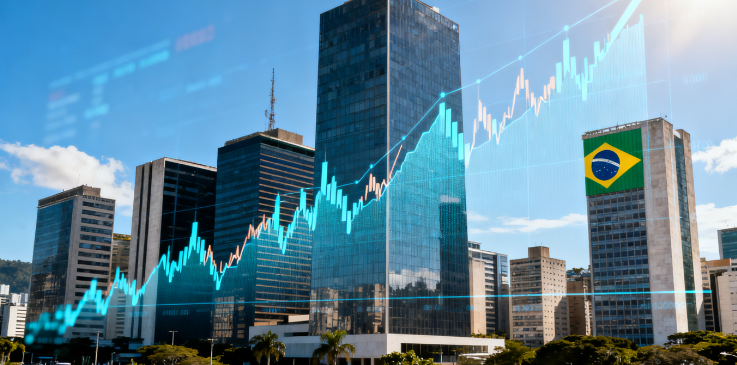
Against the backdrop of sustained pressure in domestic and international markets, the Brazilian stock market has once again hit a historic high, nearing 149,000 points. The US dollar saw its first rise after three consecutive trading days of decline, approaching 5.40 Brazilian reals.
The Brazilian B3 index Ibovespa closed at 148,780 points on Thursday (30th), up by 0.1%. The stock market opened lower but rebounded in the morning session and maintained stability in the remaining trading days. This marks the seventh consecutive trading day of gains for the Brazilian stock index, with a cumulative increase of 3.23% over the past seven trading days.
The rise in the stock market did not strengthen the exchange rate. The US dollar to Brazilian real exchange rate closed at 5.38 on Thursday, up by 0.022 reals (+0.42%). The rate reached 5.39 around 10:10 AM but then retreated later in the day. The US dollar has risen by 1.09% in October but fell by 0.21% this week. Since 2025, the US dollar has cumulatively declined by 12.95%.
Internal and external factors have been disrupting the market. Overseas, cautious sentiments were triggered by remarks from Federal Reserve Chair Jerome Powell, leading to a strengthening of the US dollar globally. During the meeting on Wednesday (29th), the Federal Reserve cut the benchmark interest rate by 0.25 percentage points. Powell stated that it is still uncertain whether there will be another rate cut in December.
The high interest rates in developed economies have spurred capital outflows from emerging economies like Brazil. The cautious stance of the Federal Reserve overshadowed the outcome of the meeting between the US and Chinese leaders, which concluded with an agreement on the rare earth issue.
In Brazil, the addition of 213,000 formal job positions in September had an impact on the market. Although there was a 15.6% drop in new job positions compared to September last year, it still exceeded investors' expectations.
Due to the employment data, the stock market dropped below 149,000 points. This was because of the strong performance in the labor market, leading to market expectations of a delay in the reduction of benchmark interest rates by the Brazilian central bank. Higher rates would prompt funds to move from riskier stock markets to fixed-income products like government bonds.
Furthermore, according to O Globo, based on data released by the Brazilian Ministry of Labor and Employment (MTE) on Thursday, Brazil added 213,002 formal job positions in September. Employment increased in all 27 federal units, with the largest increase seen in the state of São Paulo (+49,052 positions). The average starting salary for those who obtained formal employment in September was 2,286.34 Brazilian reals.
